Renowned film, television, music video, and commercial director Sanaa Hamri ’96 has never been afraid to break new ground or take on new challenges. Originally from Tangier, Morocco, Hamri is currently executive producer and director of the award-winning Empire television series, now in its sixth season. Just one highlight on her long list of accomplishments: Hamri directed professional mentor Mariah Carey’s concert documentary, The Adventures of Mimi.
Hamri returned to campus last fall for an alumni networking event for seniors: Your Liberal Arts Connections. The annual, daylong symposium is co-sponsored by the Offices of Career Services and Alumni Relations in partnership with the Alumni Association Board of Directors. As keynote speaker, Hamri shared some thoughts on her remarkable career—and how her SLC education played an important role.
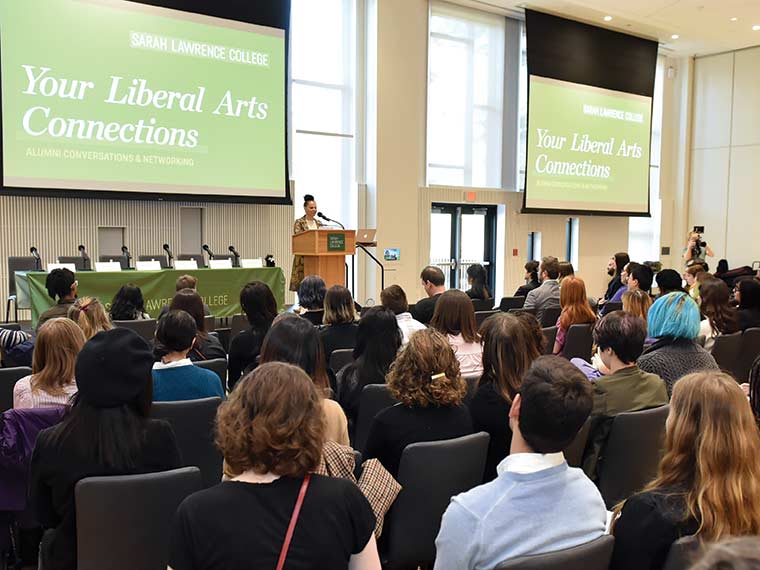
To exist in my industry, you must be at peace with the unknown. This is no “nine to five” with a retirement plan. This is life. That’s what art is about: real, raw, and rare. And a life in the arts is all based on how you perceive your reality. In my industry, it’s merely the study of human behavior paired with our imagination and make-believe.
In 1992, I got on a plane from Tangier, Morocco, to attend Sarah Lawrence. I knew I wanted to explore the arts, but most important, I wanted to be in an environment filled with progressive minds converging to create a new world of thought. I was young, starting a new life in a new country, and I had no idea what was going to happen. This place is where my love affair with the unknown began.
It might come as a surprise, but when I started here I had no intention of being a filmmaker. I did take one film course during my year abroad in Paris, a history of the New Wave in French cinema. I fell in love with that because the filmmakers were breaking the rules of what American cinema was doing in editing and in storytelling. Movies like Jean-Luc Godard’s Breathless and Last Year at Marienbad by Alain Resnais—all these movies in which you have filmmakers doing something extremely different. The advantage of being at Sarah Lawrence is that it encourages you to be different and not think like the run of the mill. That is going to be the strongest suit you will have going out into the workplace.
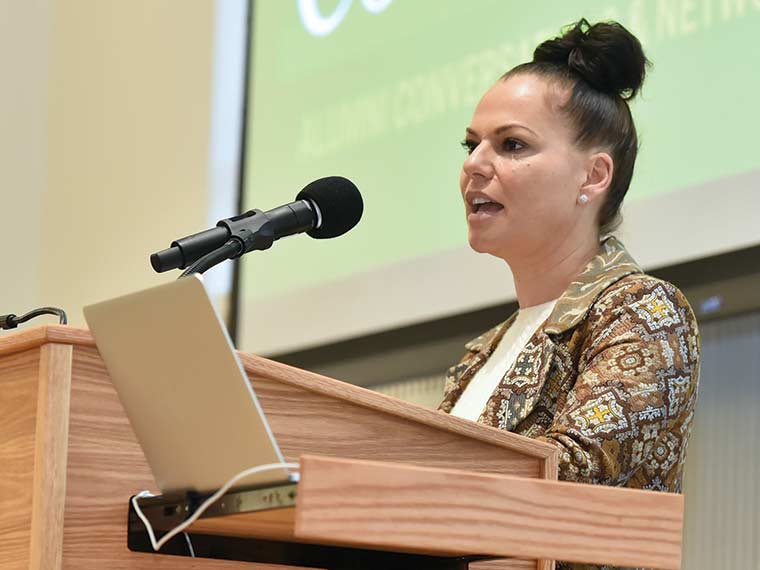 When I returned from Paris, I needed to fulfill certain requirements for theatre: complete an internship and participate in a non-performing theatrical skill—the bane of all the actors in our program here. Sarah Lawrence students despise being obligated to do anything that isn’t of their own volition, so you can imagine the discontent. Lo and behold, those two requirements were really the basis and the trajectory for my career.
When I returned from Paris, I needed to fulfill certain requirements for theatre: complete an internship and participate in a non-performing theatrical skill—the bane of all the actors in our program here. Sarah Lawrence students despise being obligated to do anything that isn’t of their own volition, so you can imagine the discontent. Lo and behold, those two requirements were really the basis and the trajectory for my career.
I landed an internship with Billy Hopkins’ casting company. Billy was connected with Sarah Lawrence because of our teacher, Shirley Kaplan (theatre, emerita). I made lasting connections, and these connections still hold firm today. Billy is my New York casting agent on Empire, so he now works for me.
For the non-performing skill, an outside director, Irving Vincent, came to put on a play at Sarah Lawrence, and I took the stage manager position … the requirement that was the bane of my existence. It turned out to be one of the best choices I ever made—something different and outside my comfort zone. When I graduated, I called Mr. Vincent, and he gave me a job as a production assistant. The cinematographer I worked with happened to be a friend of Malik Sayeed—a very famous cinemato-grapher who was shooting Spike Lee’s movie Clockers. I wound up being Malik’s personal assistant, and that’s where an entire world opened up for me.
Assisting a cinematographer was uncharted territory for me, but my one rule was never to take a job to survive that is not in close proximity to my passion, and his production company was where I discovered the music video industry. When I got bored answering phones, I started glancing through the manual for the editing machine. I was like, “You know what? Let me just try to learn some basics, so I can help when the machine breaks down.” I wound up teaching myself how to use the Avid machine, and that’s how I started cutting music videos.
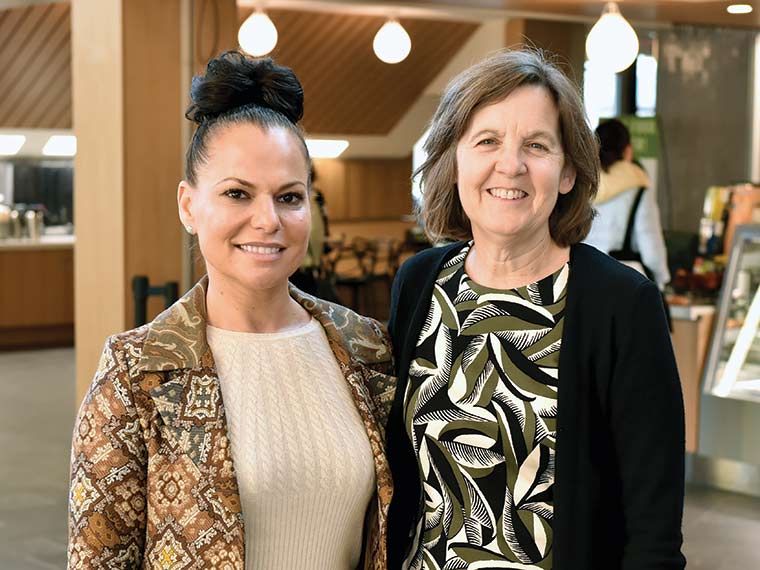 What I did know about editing was through the course I took abroad in Paris, in which I was taught about nontraditional editing—how Godard and Fellini and all of them had done that—so I ran with it and started creating my brand. One time, I was working on a video for Hype Williams for Mariah Carey, and she walked in. She had never seen a woman on the editing machine, and she kept asking me, “Where did you come from?” It’s still the same way; people are fascinated with me as an executive producer and a director.
What I did know about editing was through the course I took abroad in Paris, in which I was taught about nontraditional editing—how Godard and Fellini and all of them had done that—so I ran with it and started creating my brand. One time, I was working on a video for Hype Williams for Mariah Carey, and she walked in. She had never seen a woman on the editing machine, and she kept asking me, “Where did you come from?” It’s still the same way; people are fascinated with me as an executive producer and a director.
I went on tour with Mariah and learned the business of touring, editing, and filmmaking. At one point she told me that I should direct a music video with her. I said I wasn’t interested, that I wasn’t a director. She did not take no for an answer. So there I was, directing music videos using those liberal arts skill sets that I’d had no idea I’d need.
My choice of going into television as a director was before this whole TV boom, but I had a feeling it was going to thrive and grow, and I wanted to have my own shows and be able to work on something where you can tell a story for hours.
The state of the industry is no longer as stagnant as it used to be, but we have a long way to go for our crew list to reflect the diversity it deserves. On my show, I hire at least 50 percent female, 50 percent diverse. On all the other shows on television, it’s 5 percent. At Sarah Lawrence, you are progressive people. I look to you to challenge the system and give opportunity to people who are great at what they do—no matter where they’re from or what gender they are.
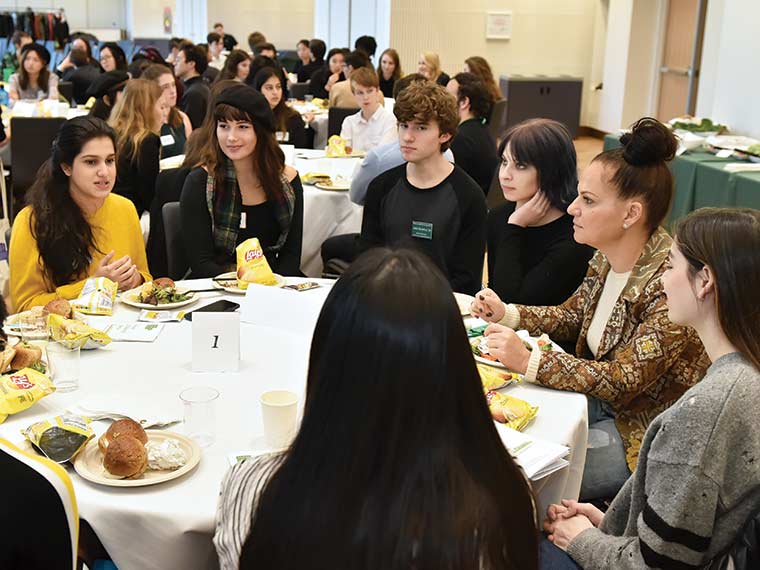
Excerpted, Edited, and Condensed by Chris Quirk
Photos by Dana Maxson
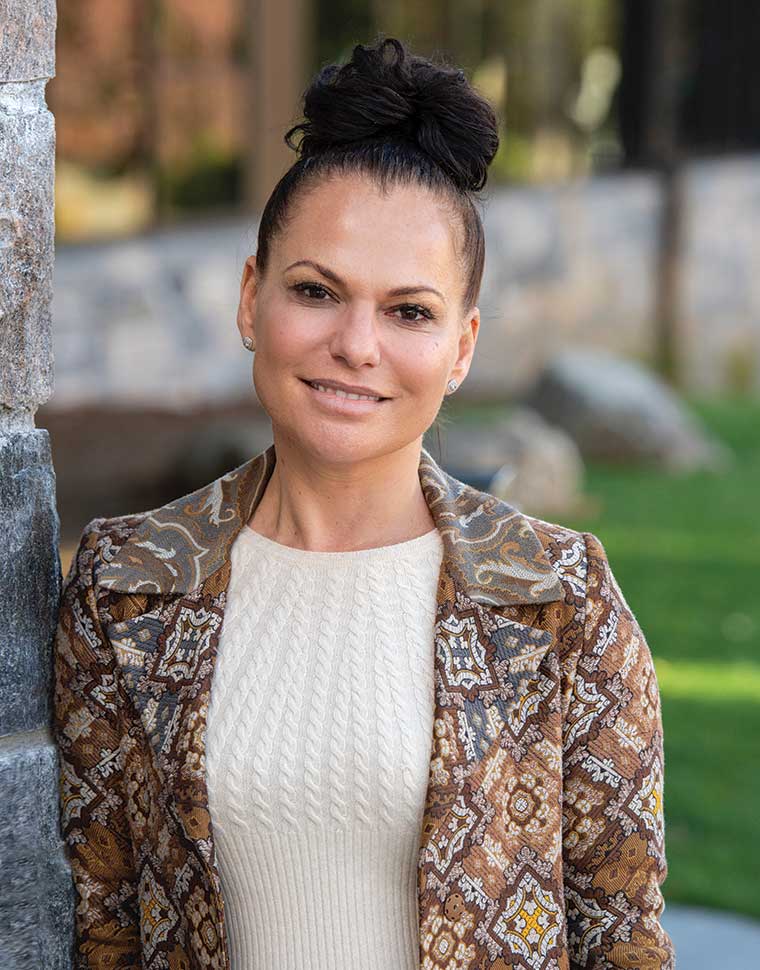
One time I was on set with Prince doing music videos, and I needed to tell the lighting guy to change something. Prince pulled me aside. He goes, ‘Stop asking for permission. Why did you ask him with a question? Tell him what you want. You’re the director.’ And it dawned on me right then and there: You cannot come hesitant to this position as a filmmaker. As women, we slide into that because of society. It’s a collective consciousness that we need to change, and to change the collective consciousness, you have to change it within yourself first.